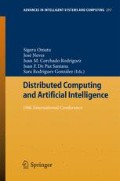Abstract
The study of the impact of emotion and affect in decision making processes involved in a working team stands for a multi-disciplinary issue (e.g. with insights from disciplines such as Psychology, Neuroscience, Philosophy and Computer Science). On the one hand, and in order to create such an environment we look at a team of affective agents to play into a battlefield, which present different emotional profiles (e.g. personality and mood).On the other hand, to attain cooperation, a voting mechanism and a decision-making process was implemented, being Robocode used as the simulation environment. Indeed, the results so far obtained are quite satisfying; the agent team performs quite well in the battlefield and undertakes different behaviours depending on the skirmish conditions.
Access this chapter
Tax calculation will be finalised at checkout
Purchases are for personal use only
Preview
Unable to display preview. Download preview PDF.
References
Marreiros, G., Ramos, C., Neves, J.: Emotion and Group Decision Making in Artificial Intelligence. In: Cognitive, Emotive and Ethical Aspects of Decision-Making in Humans and in AI, vol. IV, pp. 41–46 (2005) ISBN 1-894613-86-4
Ortony, A.: On making believable emotional agents believable. In: Traple, R.P. (ed.) Emotions in Humans and Artefacts. MIT Press, Cambridge (2003)
Hartness, K.: Robocode: using games to teach artificial intelligence. J. Comput. Sci. Coll. 19(4), 287–291 (2004)
Howard, P., Howard, J.: The BIG FIVE Quickstart: An introduction to the five factor model of personality for human resource professionals. Center for Applied Cognitive Studies, Charlotte (2004)
Forgas, J.: Mood and judgment: The affect infusion model (AIM). Psychological Bulletin 117, 39–66 (1995)
Loewenstein, G., Lerner, J.S.: The role of affect in decision making. In: Handbook of Affective Sciences. Oxford University Press (2003)
Schwarz, N.: Emotion, cognition, and decision making. Cognition and Emotion 14(4), 433–440 (2000)
Barsade, S.: The Ripple Effect: Emotional Contagion and Its Influence on Group Behavior. Administrative Science Quarterly 47, 644–675 (2002)
Neumann, R., Strack, F.: Mood contagion: The automatic transfer of mood between persons. Journal of Personality and Social Psychology 79, 211–223 (2000)
Ortony, A., Clore, G.L., Collins, A.: The cognitive structure of emotions. Cambridge University Press, Cambridge (1988)
Gratch, J., Marsella, S.: Evaluating a computational model of emotion. Journal of Autonomous Agents and Multiagent Systems 11(1), 23–43 (2006)
Mourão, D., Paiva, A.: EToy: Building an affective physical interface. In: 2nd Workshop on Attitude, Personality and Emotions in User-Adapted Interaction (2001)
Lim, M.Y., Dias, J., Aylett, R., Paiva, A.: Improving Adaptiveness in Autonomous Characters. In: Prendinger, H., Lester, J.C., Ishizuka, M. (eds.) IVA 2008. LNCS (LNAI), vol. 5208, pp. 348–355. Springer, Heidelberg (2008)
Bída, M., Brom, C.: Towards a platform for the education in emotion modeling based on virtual environments. In: 3rd Workshop on Emotion and Computing, pp. 45–52 (2008)
Marreiros, G., Santos, R., Ramos, C., Neves, J.: Context-aware emotion-based model for group decision making. IEEE Intelligent Systems Magazine 25(2), 31–39 (2010)
Ryckman, R.: Theories of Personality. Thomson/Wadsworth (2004)
Mehrabian: Analysis of the Big-Five Personality Factors in Terms of the PAD Temperament Model. Australian Journal of Psychology 46 (1996)
Santos, R., Marreiros, G., Ramos, C., Neves, J., Bulas-Cruz, J.: Personality, Emotion, and Mood in Agent-Based Group Decision Making. IEEE Intelligent Systems 26(6), 58–66 (2011)
McCrae, R.R., John, P.O.: An introduction to the five-factor model and its applications. Journal of Personality 60, 175–215 (1992)
Nakagawa, K., Shinozawa, K., Ishiguro, H., Akimoto, T., Hagita, N.: Motion modification method to control affective nuances for robots. In: Int. Conf. Intelligent Robots and Systems, pp. 5003–5008 (2009)
Haifang, L., Haipeng, H., JunJie, C.: A new layered model of affect. In: Int. Asia Conf. on Informatics in Control, Automation and Robotics (CAR), pp. 261–264 (2010)
Author information
Authors and Affiliations
Corresponding author
Editor information
Editors and Affiliations
Rights and permissions
Copyright information
© 2013 Springer International Publishing Switzerland
About this paper
Cite this paper
Rebelo, A. et al. (2013). Simulating a Team Behaviour of Affective Agents Using Robocode. In: Omatu, S., Neves, J., Rodriguez, J., Paz Santana, J., Gonzalez, S. (eds) Distributed Computing and Artificial Intelligence. Advances in Intelligent Systems and Computing, vol 217. Springer, Cham. https://doi.org/10.1007/978-3-319-00551-5_10
Download citation
DOI: https://doi.org/10.1007/978-3-319-00551-5_10
Publisher Name: Springer, Cham
Print ISBN: 978-3-319-00550-8
Online ISBN: 978-3-319-00551-5
eBook Packages: EngineeringEngineering (R0)

